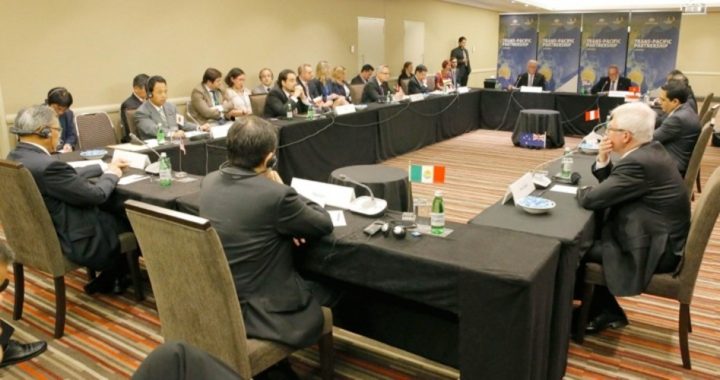
The Trans-Pacific Partnership (TPP) negotiations, a key part of Barack Obama’s efforts to use “trade” agreements (treaties) to transfer econmic and political power to supernational entities, is in danger of being slowed.
In a statement to reporters on September 4, Malaysian Trade and Industry Minister Mustapa Mohamed warned that the Trans-Pacific Partnership (TPP) wasn’t on the fast track to completion. “There has been progress, but we still have some issues to address. However, when the TPP will be concluded is an open question,” Mustapa said at the press conference.
Mustapa pointed to key provisions of the agreement that were slowing the pace of negotiations, principally those dealing with automobile manufacturing, agriculture, and dairy production.
Specifically, the statement identified the United States, Japan, New Zealand, and Australia as having significant disagreements in terms of resolving those provisions.
Currently, there are 12 countries included in the TPP trading partnership, but as The New American recently reported, bringing China into the bloc seems to be a side project of President Obama’s promised “pivot toward Asia.”
U.S. car companies objected to Japan’s participation in the TPP immediately after the announcement of its membership was made.
Japan’s participation in the U.S.-led TPP negotiations couldn’t have come at a worse time for America’s domestic auto industry, however.
As The New American reported in July 2013, the city of Detroit filed for Chapter 9 municipal bankruptcy. The car companies that call the Motor City home were quick to denounce the federal government’s entry into any trade agreement with their decades-long competitor, Japan.
In an article published that year by the Wall Street Journal, autoworkers’ worries were summarized:
Some 80,000 auto workers from Chrysler Group LLC, Ford Motor Co. and General Motors Co. signed a petition criticizing Japan for what they called its “closed” market for cars, according to the American Automotive Policy Council, an alliance to promote international trade and economic policies.
U.S. Representative Sandy Levin of Michigan, the ranking member of the House Ways and Means Committee, said that any elimination of tariffs on car imports into the United States should be tied immediately to the “opening of the Japanese auto market.” An immediate connection between U.S. duties and access to the Japan car market is better than a phased tariff elimination envisioned in the TPP, he added.
Levin has also come out in support of ensuring that trade agreements include a means of taking action against countries that manipulate their exchange rates.
In a petition published in 2013 by the American Automotive Policy Council, the representatives for the autoworkers spelled out their opposition to Japan’s decision to join the TPP negotiations. “Through petitions, that will begin arriving today, tens of thousands of hourly and salaried employees at Chrysler, Ford and General Motors urged Congress to strongly oppose completing the Trans-Pacific Partnership (TPP) with Japan at this time unless currency disciplines and non-tariff barriers are addressed,” the statement reads.
Currency manipulation is at the heart of the car companies’ concerns. As described by the International Business Times:
Japan is accused of manipulating its currency at the behest of its top automakers, including the world’s largest by sales volume, Toyota Motor Corporation (TYO:7203).
Lowering the value of a currency makes a country’s locally made goods more competitive internationally. About 94 percent of all cars sold in Japan are made in Japan, according to Rep. Sander Levin (D-Mich.) of the House Ways and Means Committee, who said that the U.S. would have to phase out its import tariffs of 2.5 percent for cars and 25 percent for trucks in order to compel Japan to open up its auto market.
Regarding the hangup on the issue of the protection of domestic dairy production, in June 2014, American dairy farmers and milk processors promised to work to thwart passage of the Trans-Pacific Partnership (TPP) if trade representatives from Japan and Canada do not agree to significantly increase the amount of dairy imported from the United States.
In a letter addressed to the U.S. Trade Representative (USTR) and the Department of Agriculture, a substantial consortium of U.S. dairy farmer cooperatives and dairy processing companies, all of which are members of the National Milk Producers Federation (NMPF) or the U.S. Dairy Export Council (USDEC), “threatened to withdraw support” from the pending purported trade agreement if the two TPP partners “refuse to follow through on pledges to provide comprehensive market access for U.S. dairy products.”
Far from opposing the sovereignty surrender masquerading as a “free trade agreement,” the dairy industry brags in its letter of its work to make sure the TPP is passed and put into force.
“USDEC has been one of the most vocal champions of the importance of including Japan and Canada in TPP since these markets offer strong opportunities for our members to expand U.S. dairy exports,” stated Tom Suber, president of USDEC.
“However, it is critical that their participation in TPP be meaningful and comprehensive across all dairy products. It is entirely unacceptable to have such sizable, sophisticated economies refusing to undertake the necessary openness that they agreed to upon entering TPP.”
Jim Mulhern, president and CEO of NMPF, noted in a press release that, “As we have made clear in our letter to Ambassador Froman and Secretary Vilsack, we want to see very strong outcomes on market access with Japan and Canada, and our industry remains prepared to match the level of ambition of those countries. To be successful, any eventual TPP agreement must result in more open dairy markets in Japan and Canada.”
Given the frightening assault on American sovereignty and lawmaking power, it is surprising that domestic industry would work so hard to hand over control of regulatory authority to an international body of bureaucrats, all of whom will be unaccountable to the American people ostensibly served by the dairy industry.
For its part, Canada has made clear its intent to protect its national interests from being sacrificed on the altar of global integration.
On July 16, the Globe and Mail reported:
American officials including chief U.S. negotiator Michael Froman have repeatedly publicly prodded Canada to produce a “meaningful offer” and disclose to the U.S. what kind of agriculture concessions it will make. Trade ministers from 12 countries are preparing to gather in Hawaii shortly for what some describe as a final push for a TPP deal.
Canada’s Trade Minister Ed Fast dismisses these challenges from Washington, telling The Globe and Mail last week that “the Americans prefer to negotiate this agreement through the media” and he won’t.
Sources say as far as the U.S. is concerned, Canada promised that “things that weren’t addressed in the North American free-trade agreement — poultry and dairy — were going to be addressed” in the Pacific Rim talks.
“That was very clear; that was agreed upon,” a source familiar with the trade talks said.
In the United States, despite the fact that they have been repeatedly stiff-armed by the USTR when they have tried to exercise some TPP oversight, Congress seems satisfied to allow corporations to assume its oversight role.
As it stands, there are over 600 industry lobbyists and “advisors,” as well as unelected trade representatives, seated at the negotiating table.
Each of the “partners” to the pact, including foreign corporations, would be exempted from abiding by American laws governing trade disputes. Moreover, the sovereignty of the United States and the Constitution’s enumeration of powers would once again be sacrificed on the altar of global government by subordinating U.S. laws passed by duly elected representatives of the people to a code of regulations created by a team of transnational bureaucrats.
Remarkably, even Mexico appears more ardently interested in maintaining its sovereignty over domestic lawmaking than its American counterparts.
Mexico’s minister of the economy, Ildefonso Guajardo, rejected reporters’ efforts to hold Mexico accountable for the delay in wrapping up the TPP at meetings held in July in Hawaii. “What you can accuse me of,” he said, is protecting “the interests of my country.”
Regrettably, by working to create the TPP, American leaders have forgotten the interests of their country and have made one accession after another to globalist bureacrats in the name of integrating the economy of their country with that of its partners in the Pacific Rim.
Photo of TPP ministerial meeting: AP Images



